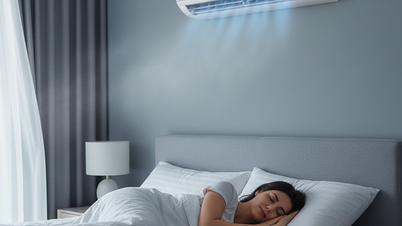Numerous studies have shown that pets can help reduce stress levels, encourage exercise, and provide other mental benefits. In particular, many owners say that pets help them sleep better.
More and more people are choosing to let their pets sleep in bed with them. However, experts warn that this also brings many potential risks to physical health, especially for the skin or respiratory system.

Sleeping with pets can lead to skin and respiratory diseases.
PHOTO: AI
Risk of skin diseases
According to specialist doctor Doan Thi Thuy Dung, Department of Dermatology, Gia An 115 Hospital, sleeping with pets poses many risks to the skin, especially if the pet is not cleaned regularly or the owner has sensitive skin.
Pet fur, dirt, bacteria, fungi and parasites (such as ticks and fleas) can stick to bedding, pillows or come into direct contact with the skin, causing irritation, contact dermatitis, or aggravating existing skin diseases such as atopic dermatitis, psoriasis, acne, etc. Some skin diseases that can be transmitted from pets to humans through close contact include:
Skin fungus : Fungi such as Microsporum and Trichophyton (causing ringworm, hair fungus, nail fungus) can be transmitted from dogs and cats to humans, especially through direct contact or through bedding.
Scabies and Parasitic Dermatitis : Scabies (Sarcoptes scabiei from dogs) or fleas can cause severe itching and skin lesions. Ticks or fleas can cause localized dermatitis in the area of skin contact.
Bacterial Skin Infections : Certain bacteria from pets, such as Staphylococcus or Streptococcus, can cause pustules, sores, or skin infections if the human skin has a scratch or open wound.
Dr. Thuy Dung said: “The extent of the impact depends on the hygiene of the pet, the sleeping environment as well as the skin health of the owner. For example, people with sensitive skin or weak immune systems are more susceptible to the effect. In addition, allergens from pet hair (such as proteins in saliva or flaky skin) can cause allergic reactions, leading to itching, redness or skin damage.”
Dr. Thuy Dung also warned that people with atopic dermatitis, allergic hives, psoriasis, and acne may have their condition worsened if they are frequently exposed to fur, dust, or allergens from pets. “Small particles from animal fur can easily clog pores, creating conditions for bacteria to grow, thereby causing acne to flare up. At the same time, the hypersensitive immune system in people with atopic dermatitis easily reacts strongly to allergens, making the disease even more difficult to control.”

Proteins on pet hair can cause allergies in the body, triggering an immune response, leading to coughing, wheezing, difficulty breathing or milder symptoms such as sneezing and stuffy nose.
Photo: AI
Effects on the respiratory system
According to specialist 2 Du Van Dung, Department of Respiratory, Gia An 115 Hospital, when living with pets, especially when sleeping together, owners can easily inhale very small particles stuck on their fur such as skin flakes, dust or fungal spores or proteins from dried saliva, dried urine. These particles are very small, invisible to the naked eye, easily float in the air or stick to the surface of tables, chairs, bed sheets, children's toys and will affect the respiratory tract if inhaled.
“The proteins on the fur that cause allergies to the body can trigger an immune response that promotes excessive immune reactions, causing bronchial spasms, bronchial mucosal edema, and increased mucus secretion. This will lead to coughing, wheezing, difficulty breathing, or milder cases of sneezing, nasal congestion, or asthma attacks if the body already has asthma,” said Dr. Dung.
Dr. Dung also warned that some people are more susceptible to the effects of sleeping with pets, such as children or the elderly. Children have short respiratory systems and thin respiratory mucosa, so they are more susceptible to pneumonia than adults. Lung function and human resistance will naturally decrease with age, so when the elderly inhale pathogens from pet hair, they are more likely to cough, pneumonia, and aggravate existing diseases such as chronic bronchitis, COPD (chronic obstructive pulmonary disease), increasing the risk of hospitalization.
In particular, for people with asthma or allergic rhinitis, allergens from pets are one of the factors that trigger asthma attacks, difficulty breathing, or make the disease persistent and difficult to treat.
How to sleep safely with pets?
According to experts, if owners still want to maintain the habit of sleeping with their pets, they need to pay attention to controlling allergen sources and keeping the bedroom environment as clean as possible.
Specifically, pet owners should bathe and brush their pets 2-3 times a week; clean their ears, nails and remove parasites according to the veterinarian's instructions; wipe their feet with disinfectant or at least wet wipes every time they come home from a walk. The bedroom, bedding and pillows also need to be cleaned regularly, washed with hot water or suitable detergents to remove hair and bacteria. If possible, pet owners can vacuum with a machine with a HEPA filter and combine it with an air purifier to reduce the concentration of dust particles and pet hair in the room.
In addition, pet owners need to wash their hands and face after close contact with pets. For people with chronic respiratory diseases such as asthma, allergic rhinitis or chronic skin diseases such as atopic dermatitis, psoriasis, it is best not to sleep with pets. If the above abnormal symptoms appear, the pet owner should immediately go to the doctor for timely diagnosis and treatment to avoid complications or widespread spread.
Source: https://thanhnien.vn/ngu-cung-thu-cung-tiem-an-nhieu-nguy-co-ve-suc-khoe-185251009202948124.htm





![[Photo] Standing member of the Secretariat Tran Cam Tu works with the Standing Committee of the Party Committee of the Ministry of Health](https://vphoto.vietnam.vn/thumb/1200x675/vietnam/resource/IMAGE/2025/10/10/1760079818773_image-4-6972-jpg.webp)
![[Photo] Unique Phu Gia horse hat weaving craft](https://vphoto.vietnam.vn/thumb/1200x675/vietnam/resource/IMAGE/2025/10/10/1760084018320_ndo_br_01-jpg.webp)
![[Photo] "Exposing letters" in the flood center of Lang Son](https://vphoto.vietnam.vn/thumb/1200x675/vietnam/resource/IMAGE/2025/10/10/1760080117518_ndo_br_z7101324112737-07cd4d1c01801a8ccf4ae0cbaf31c4a3-507-jpg.webp)






























































































Comment (0)